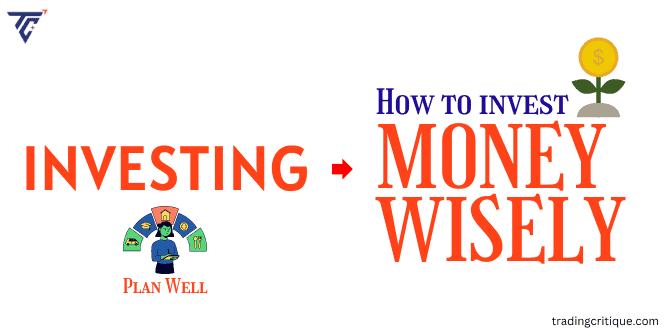Money is crucially important in life. Its value depends on how it grows over time. Let’s say you have 1 lakh rupees. If you just keep it without doing anything, it becomes useless.
Investing wisely in the stock market, mutual funds, bonds, or CDs can help you make more money and become wealthy.
We’re here to help you figure out how to invest your money, even if you’re a beginner.
How can I start investing my money?
Starting to invest your money can be a big step towards reaching your financial goals. How to invest money for beginners? Here we provide a step-by-step guide to get you started as a beginner.
Decide your investment goals
Before jumping into investing, it’s important to determine what you want to achieve. Are you saving for retirement, a down payment on a house, or something else? Understanding your goals will help you choose the right investment options and manage your risk.
Choose an account type
Depending on your goals, you’ll need to select the appropriate investment account. There are three main types:
Brokerage account
- It’s like a regular investment account where you can buy and sell different types of investments like stocks and bonds.
- It is useful for people who want flexibility and control over their investments.
- You might have to pay taxes on any money you make from your investments.
401(k)
- It’s a retirement account set up by your employer. It helps you save for retirement throughout your working life.
- It’s useful for saving for retirement with tax benefits. Plus, some employers match your contributions, which can help your savings grow faster.
- However, there are limits on how much you can contribute each year, and you might face penalties if you withdraw money before retirement.
Individual Retirement Account (IRA)
- It’s a retirement account you can open on your own.
- It is useful for saving for retirement with tax benefits, similar to a 401(k), but you have more control over your investments.
- There are rules about how much you can contribute each year and when you can withdraw the money without penalties.
Open the account and fund it
Once you’ve chosen an account type, you’ll need to open it and deposit money into it. Decide where to open the account and how much to invest. With a 401(k), contributions are often deducted from your pay check, while IRAs and brokerage accounts require manual deposits.
Understand your risk tolerance
Determine how much risk you’re comfortable with. Investments come with varying levels of risk and potential returns. Consider factors like age, financial stability, and investment timeline.
Choose your investment strategy
Decide whether you want to be a short-term or long-term investor.
Short-term Investing
- Day trading: Investors buy and sell assets within the same day, aiming to capitalize on small price movements. It’s risky and challenging, especially for beginners.
- Swing trading: Investors buy and sell assets over a few days or months to profit from market swings caused by seasonal events or patterns.
Long-term Investing
- Index investing: This strategy involves investing in entire sections of the market, such as index like the s&p 500, rather than individual stocks. It’s less risky than picking individual stocks and often offers good returns over time with low fees.
- Value investing: Investors using this strategy look for stocks that the market undervalues. Famous investors like Warren Buffett use this approach.
- ESG investing: ESG stands for environmental, social, and governance. Investors who follow this strategy pick stocks or funds based on how well companies handle these issues, aiming to support companies that are good corporate citizens.
- Dividend investing: Some investors focus on buying stocks that pay regular dividends to shareholders, providing a steady income stream over time, though it may require a significant initial investment.
Build your portfolio
Select a mix of assets that align with your goals and risk tolerance. Common investment options include stocks, bonds, mutual funds, and ETFs. Having a variety of investments can help reduce risk.
Monitor and rebalance your portfolio
Check on your investments regularly and make changes if necessary. Rebalancing means adjusting your portfolio to keep it in line with your goals and risk level. This helps make sure your investments stay on track.
What is the best way to invest money?
Investing your money means putting it into different places where it can grow over time.
Where should I invest my money? There are many options for investing, like savings accounts, stocks, bonds, and even cryptocurrencies.
The best way to invest depends on your goals and how much risk you’re comfortable with.
Bonds
Bonds are like loans you give to either the government or a company. They promise to pay you back with interest over time.
Government bonds are very safe because they’re backed by the government, while corporate bonds are riskier because they depend on the company’s ability to pay.
You can buy bonds either individually or through bond funds from a broker or directly from the government or the company issuing the bond. Bonds are good for people who prefer less risk in their investments and want a steady income.
Money market funds
Money market funds invest in short-term, low-risk securities such as Treasury bills, commercial paper, and certificates of deposit.
They aim to provide stability and liquidity while generating modest returns. Money market funds are suitable for investors seeking preservation of capital with some income potential.
What is the safest way to invest money? The safest way to invest money is through high-yield savings accounts and certificates of deposit (CDs).
High-yield savings accounts
These accounts offer higher interest rates compared to traditional savings accounts, allowing your money to grow over time. They are typically offered by online banks and have limited transactions per month.
High-yield savings accounts are suitable for short-term savings goals or emergency funds because they provide easy access to your money when needed.
Certificates of deposit (CDs)
CDs are time deposits offered by banks with fixed interest rates and maturity dates. You deposit a certain amount of money for a specific period, typically ranging from a few months to several years.
CDs generally offer higher interest rates than savings accounts, but you’ll face penalties for withdrawing funds before the maturity date. CDs are ideal for saving towards specific goals within a known timeframe, such as a down payment on a house or a vacation.
Mutual funds
A mutual fund is like a group savings account where lots of people put their money together to invest in stocks, bonds, or other things.
It’s good for long-term saving, and you can buy them directly from the fund company or through a brokerage. They’re a smart way to spread your money around and reduce risk.
Index funds
Index funds are a type of mutual fund or ETF that aims to replicate the performance of a specific market index, such as the S&P 500 or the Dow Jones Industrial Average.
They offer low fees, broad diversification, and a passive investment approach. Index funds are ideal for long-term investors seeking market returns with minimal management.
Exchange-traded funds (ETFs)
ETFs are similar to mutual funds but trade on stock exchanges like individual stocks. They offer intraday trading, lower expense ratios, and tax efficiency. ETFs provide diversification across asset classes and sectors and are suitable for investors seeking flexibility and liquidity.
Stocks
Stocks represent ownership in a company and offer the potential for capital appreciation and dividends. They are classified into different categories based on market capitalization, sector, and growth potential.
Stocks are considered riskier than bonds but offer higher returns over the long term. They are suitable for investors with a higher risk tolerance and a long investment horizon.
Individual stocks
Investing directly in individual companies’ stocks. It requires research and analysis to select promising companies with growth potential.
Dividend stocks
Stocks that pay regular dividends to shareholders. They provide income and can offer stability during market downturns.
Other investments
Other investments include assets beyond traditional stocks and bonds, such as commodities, real estate, hedge funds, private equity, and cryptocurrencies.
They often have a low correlation with traditional asset classes and can provide diversification and the potential for higher returns. However, alternative investments are typically less liquid and may carry higher risk and complexity.
Cryptocurrency
Cryptocurrencies are digital or virtual currencies that use cryptography for security and operate on decentralized networks based on blockchain technology.
Bitcoin, Ethereum, and Ripple are examples of popular cryptocurrencies. They offer the potential for high returns but are highly volatile and speculative. Cryptocurrencies are suitable for investors willing to tolerate high risk and volatility.
Real estate
Real estate investments involve purchasing, owning, or leasing property to generate income or capital appreciation. They include residential, commercial, and industrial properties, as well as real estate investment trusts (REITs) and real estate crowdfunding platforms.
Real estate offers diversification, inflation protection, and passive income but requires substantial capital and on-going management.
Conclusion
Investing is about reaching your long-term goals, and putting your money into smart choices helps it grow and keeps you financially secure.
Figure out what you want to achieve with your investment portfolio, how much risk you’re okay with, and the time horizon, and explore your options like stocks, bonds, real estate, or cryptocurrencies.
Do your own researches, get advice if needed, and keep an eye on your investments. Remember, all investments carry some risk. If you invest without understanding, you could lose money. So, make choices that suit your situation and goals.
Pro Tip
Parallel to understanding mortgage interest, enhancing your trading success involves leveraging the expertise of our trusted Forex brokers. Stay current with opportunities in CFDs, forex, stocks, and cryptocurrencies, and utilize authentic broker reviews to guide your trading decisions. The principles of informed decision-making in mortgage interest can similarly be applied to trading, where knowledge and strategic planning are key to success.
Frequently Asked Questions
1. How should a beginner start investing?
- Start investing early to let your money grow over time.
- Dedicate 10-15% of your income for investments each year.
- Open an account like a retirement or brokerage account.
- Pick an investment approach that suits your goals and risk tolerance.
- Understand your investments and adjust as needed over time.
2. Is it better to save or invest?
It depends on your goals. Saving is for short-term needs or emergencies, providing stability and quick access to funds.
Investing is for long-term growth, offering the potential for higher returns over time but with some risk. It’s often best to have a mix of both based on your financial objectives.
3. Is investing actually worth it?
Yes, investing is worth it because it can provide higher returns compared to saving alone, thanks to compounding. There are various investment options available, such as stocks, bonds, mutual funds, and ETFs, allowing you to grow your money over time.
4. Can I invest money and get monthly income?
- Yes, you can invest money and receive monthly income.
- Several investment options offer monthly income, such as savings accounts, certificates of deposit (CDs), dividend-paying stocks, bonds, annuities, rental real estate, real estate investment trusts (REITs), and business ownership.
- Each investment option has its risks and benefits, so choose based on your goals and risk tolerance.
5. How do I invest if I am scared of losing money?
- Start by investing small amounts in low-risk options like index funds or ETFs.
- These spread your money across many companies, reducing the risk of losing it all.
- Remember to only invest money you can afford to lose, and think long-term.
- With patience and careful choices, you can grow your wealth steadily over time.
6. What is the simplest investment?
The simplest investments include cash deposits like savings accounts and CDs, as well as bonds, mutual funds, and ETFs. These options offer stability, fixed returns, and diversification for beginners.
7. What is the safest investment with the highest return?
The safest investments with higher return potential include high-yield savings accounts, CDs, bonds, and money market funds.







